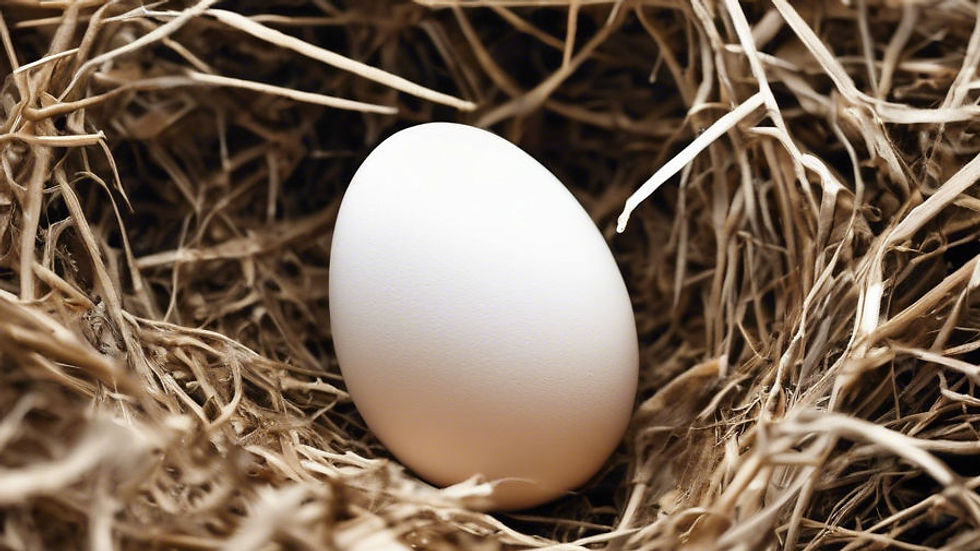The Importance of Farm Fresh Eggs and Their Protective Coating
- Lulu's Farm

- May 7, 2025
- 4 min read
Updated: Jun 2, 2025
Eggs have a natural protective layer called the bloom, or cuticle, that helps keep them fresh. This coating acts as a barrier against bacteria and pathogens. It also helps to seal in moisture, making sure the eggs don't dry out too quickly. The bloom is a natural feature of eggs that ideally should remain untouched until you are ready to cook or bake with them.

The bloom consists of proteins and substances like glycoproteins, which bond tightly to the eggshell. According to egg industry studies, unwashed eggs can remain fresh for several weeks or even months, while washed eggs may spoil within a week or two. This is significant, especially for families looking to maximize the value and usefulness of their locally sourced eggs.
Risks and Consequences of Washing Eggs
Washing eggs may seem like a good idea to ensure cleanliness, but this practice can actually ruin their protective coating. When you wash an egg with water, you may inadvertently remove the bloom. Doing so exposes the eggs to potential bacteria that can penetrate the eggshell more easily.
Studies indicate that bacteria such as Salmonella can reside on the surface of unwashed eggs. If the eggs are washed, they may become more vulnerable to these harmful bacteria, especially if the eggs are not dried properly afterward. The moisture left on the shell can create an environment conducive to bacterial growth.

It's crucial to remember that eggs have been laid in a naturally clean environment. Farm fresh eggs typically come with very little contamination, thanks to the hen's natural instincts. By washing away the bloom, you disrupt this natural defense system. This increases the risk of spoilage or illness.
Ideal Practices for Egg Storage
To retain the integrity of your farm fresh eggs, follow these essential storage practices:
Store in a cool, dry place: Ideally, eggs should be kept refrigerated. However, they can also be stored at room temperature if used within a few weeks. Just make sure they are in a cool location.
Do not wash until needed: Store the eggs unwashed. Only clean them right before you are about to use them. This way, you can keep their protective layer intact.
Check for dirt: If you notice a bit of dirt on your eggs, you can gently brush it off with a dry cloth or a soft brush. This minimally invasive approach helps keep the bloom intact while still maintaining cleanliness.

Keeping your eggs stored correctly not only helps prolong their shelf life but also enhances their flavor. Fresh, unwashed eggs provide a better quality product that can elevate your cooking and baking.
Understanding Freshness and Expiration Dates
Knowing how to determine egg freshness can be very helpful, especially when dealing with farm fresh eggs. Unlike commercially produced eggs, which often have expiration dates printed on the carton, farm fresh eggs may not come with such labels. Instead, you can use various methods to test for freshness, including:
The Float Test: Fill a bowl with water and gently place an egg in it. Fresh eggs will sink to the bottom and lay flat on their side. If an egg stands upright or floats, it’s best to discard it.
The Sniff Test: A fresh egg will have little to no odor. If an egg smells bad when cracked open, it is spoiled and should be thrown away.
These methods are simple and can help local families ensure they're using the freshest eggs possible.
Benefits of Farm Fresh Eggs
In addition to knowing how to maintain their quality, it's vital also to understand the benefits of farm fresh eggs over store-bought varieties. Here's why they stand out:
Better Taste: Many people swear that farm fresh eggs have a richer and more flavorful yolk compared to those from commercial sources.
Higher Nutritional Value: Studies have shown that eggs from pasture-raised hens often contain higher levels of omega-3 fatty acids and vitamins compared to conventional eggs.
Support Local Farms: By purchasing farm fresh eggs, you're supporting your local agricultural community. You're also promoting sustainable farming practices.
Eating local not only tastes better but also contributes to a healthier community. This mindful approach to your diet and food choices creates a connection with your food source.
Cooking with Farm Fresh Eggs
When you have farm fresh eggs at your disposal, you might wonder how best to use them. Here are some delicious ideas:
Breakfast Dishes
Farm fresh eggs make the perfect base for a variety of breakfast dishes. You can whip up fluffy scrambled eggs or a hearty omelet loaded with vegetables. Their rich flavor can truly make your morning meal stand out!
Baking
When baking, farm fresh eggs add moisture and richness to cakes and pastries. Whether you’re making a classic pound cake or decadent chocolate brownies, fresh eggs can elevate your treats.
Cooking Techniques
Consider experimenting with different cooking techniques. Farm fresh eggs are excellent when poached, boiled, or fried. Each method brings out their unique flavors.
Final Thoughts on Egg Care
In summary, understanding the importance of the natural protective coating on farm fresh eggs can significantly impact how you store and enjoy them. The bloom acts as a vital barrier against bacteria and helps to maintain the freshness of your eggs for a longer duration.
By following best practices like storing unwashed eggs and washing them just before use, you'll ensure that your eggs remain safe to eat and delicious. Remember, the next time you buy eggs from your local farm, keep that protective layer intact for the highest quality product!
Choose wisely, and enjoy the benefits of farm fresh eggs while supporting local farms in your community!



Comments